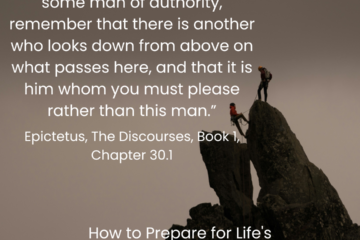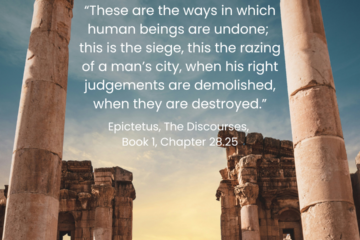The Discourses of Epictetus, Book 1.24: How Should We Struggle Against Difficulties?

You can find more Epictetus quotes here.
How do we deal with difficulties in our lives? We all face them and some are worse than others. This is a big topic in Stoic philosophy because the Stoics knew that the obstacles we face are often a source of anxiety or worry. Adding to that, they also realized that these difficulties come from our minds when we hand over our power to externals.
“Difficulties are the things that show what men are.”
Epictetus, The Discourses, Book 1, Chapter 24.1
Discourses 1.24 starts strong with an excellent display of what difficulties are. They are a testing ground to show ourselves and the world who we are. We can see this theme come back in other writing, such as Seneca’s letters and Marcus Aurelius’ Meditations. Epictetus spent a lot of time on this very topic. And he dove into the source of our difficulties and how to solve them.
The initial meeting with difficulties
These obstacles often seem to fall out of a clear blue sky, but most of the time they build up unseen in our minds. And then they appear together with an initial feeling of anxiety, worry, fear, or anger. Lady Fortune has dealt us a card we didn’t expect and she goes against our wants and desires. That is before we apply our Stoic mindset.
“Henceforth, when some difficulty befalls you, remember that god, like a wrestling master, has matched you with a rough young man.”
Epictetus, The Discourses, Book 1, Chapter 24.1
The Stoics, like Epictetus, remind us that we should look at adversity as a training ground. A test to see where we stand. Stoicism focuses on making continuous personal growth. To measure our progress we need a test now and again. With this mindset, the Stoic would welcome obstacles. The ultimate one is death, the final test philosophy helps us prepare for.
The Olympic victor as the Sage
“For what end? That you may become an Olympic victor, and that cannot be done without sweat.”
Epictetus, The Discourses, Book 1, Chapter 24.2
Listen to the Via Stoica Podcast episode we had with Olympic Gold Medal winner Mark Tuitert here.
“No man, in my opinion, has a more advantageous difficulty on his hands than you have, if only you will but use it as an athlete uses the young man he is wrestling against.”
Epictetus, The Discourses, Book 1, Chapter 24.2

Epictetus uses the Olympic athlete as an example his contemporaries could relate to. Those who trained hard and endured hardship willingly to stand at the top of Mount Olympus. Translating this to Stoicism, the athlete becomes the sage. The sage welcomes, or better yet, invites difficulties. Paradoxically, by looking at the obstacles as tests and as gateways to improvement, they stop being obstacles.
Why is there a need for virtue if there is no application for it? The application of virtue is required when we deal with difficulties and adversity appears. Then we need to use our wisdom, justice, temperance, and the focus of this discourse; our courage. We identify these difficulties by looking at our preferred way of life. We have ideal outcomes in mind when it comes to events. Whenever something happens that goes against this ideal, then we are faced with obstacles.
Courage is our tool
“We are sending you to Rome as a spy; but no one ever sends a coward as a spy.”
Epictetus, The Discourses, Book 1, Chapter 24.3
He continues to say that this spy would come running back at the first sound stating that the enemy is already among us. We are not spies in life, but we are heading into the unknown. It requires courage to live, as we can read in Seneca’s texts. When we let fear guide us, then everything will appear as a threat. We will then cower and stop living our lives.
Whereas the coward labels everything as terrible and looks at life through fearful glasses, the courageous spy knows what the true value of these externals is. That’s where Epictetus sends out Diogenes to give us a real glimpse of life.
“He [Diogenes] says that death is no evil, for it is not dishonourable; that defamation is an empty noise made by madmen.”
Epictetus, The Discourses, Book 1, Chapter 24.6
Diogenes is able to show us the truth because he looks at the world through clear lenses. His wants, desires, and aversions do not cloud his judgment. He places the right value on the right things and therefore takes away the power they hold over us.
“He [Diogenes] says that to be naked is better than any purple-bordered robe, and that to sleep upon the bare ground is the softest bed.”
Epictetus, The Discourses, Book 1, Chapter 24.7
Remember what is your own
“Go back again and examine things more accurately, putting aside your cowardice.”
Epictetus, The Discourses, Book 1, Chapter 24.10

Our initial impression of the difficulties we face isn’t an objective one. We need to go back, be courageous, and see what is going on. Use reason and logic to examine the true nature of what is happening. Instead of letting it fester in our minds and become an earth-shattering event, we can address it and maintain it to the right size.
Now Epictetus brings us right back to what is our own and helps us remember what this means.
“If you will but remember what is your own, you will not claim what belongs to others.”
Epictetus, The Discourses, Book 1. Chapter 24.11
That what belongs to us is our mind, the rest is all on loan. It is our character and our soul that we need to guard. The rest can be used by others to provoke fear and worry when they want to claim these things.
“Take this poor body of mine, take it all. If I can throw my body to this man, can I still be afraid of him?”
Epictetus, The Discourses, Book 1, Chapter 24.13
The value we place on things that others can take away is a power we give to them. When we understand that we can still be good people even if everything is taken away from us, we will see the true power we have. The good life can be lived no matter the circumstances because the good life focuses on the state of our character and soul. These are parts of our human existence that no one can lay claim to. These are ours to protect and nourish.
To summarize how to deal with difficulties
“Remember that the door is open.”
Epictetus, The Discourses, Book 1, Chapter 24.20
“Do not be more cowardly than children, but just as they say, when the game no longer pleases them, ‘I will play no more.’”
Epictetus, The Discourses, Book 1, Chapter 24.20

The Stoics acknowledge that there always is a way out of a problem. They don’t shun death as a final escape, but it’s no light matter to them. It needs to be examined by pure reason and logic and only used if it is needed to save your soul and character. Life is too precious to end without working through the difficulties. But this also applies to our jobs, our relationships, and our communities. We are not stuck in these situations but we are not strong enough to leave them when they are no good to us.
If you are dealing with difficulties and are looking for support, go to our Stoic Coaching page to learn more.
And unless we make a change and understand that it is in our power to take these steps and trust that things will be alright, if not better. If we cannot do these things, then Epictetus has one final advice for us as he ends this discourse:
“But if you stay, stop moaning.”
Epictetus, The Discourses, Book 1, Chapter 24.20



0 Comments